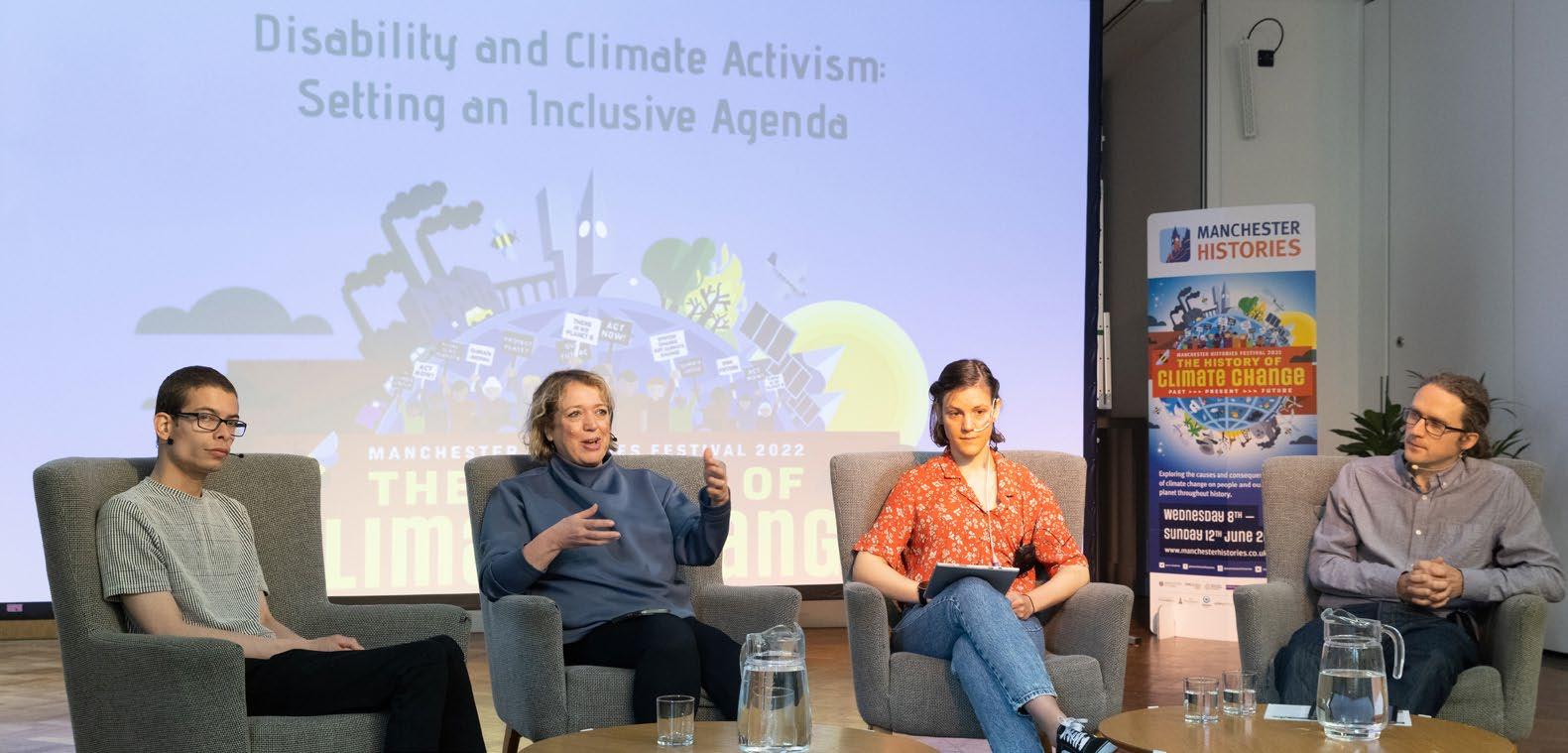
4 minute read
Key Festival Outcomes
The following report examines the festival through a case study approach where different partners, venues, and commissions are investigated individually. This analysis highlighted the following key outcomes:
Climate Awareness and Action
With the emphasis of this year’s theme focusing on climate change, this sparked a need to explore to what extent the festival has raised awareness and encouraged visitors to take climate-based action. Findings from the feedback forms indicate that the festival was successful in achieving this aim with 72% of respondents noting that they would take some form of action based on their visit to the festival, which included reducing their plastic usage, eating a more vegetarian diet, and reducing their car usage.
Widening Access to Local History
The broad range of events that channelled the climate change message was shown to be an effective way of widening access to local history. This included partnering with organisations such as Crossing Footprints and Gallery Oldham, which provided more nuance to the historical knowledge presented at the festival.
A Sense of Community
Festival events such as the Opening Night and the Celebration Day provided an informal and social setting for visitors to come together to learn about the history and cultural organisations in the area. These events were found to be invaluable in building a sense of community and the festival is found to be an important cultural mediator for potential collaborations between the organisations, groups, and visitors in the region.
The food and drink day at Angel Meadow Park also played a vital role in harnessing a sense of community and social atmosphere for stall holders and visitors. Future events could capitalise on these types of events and promote the food and drink element as a way to reach different kinds of audiences to other events on the programme.
Resilience
Carbon Literacy Training was included in the process of this year’s festival with the Community Engagement Manager being trained to provide sessions for festival volunteers. The investment in this training will be important for future events and support the festival in maintaining a sustainability focus.
Partnerships
Partnerships remain an integral way for the festival to achieve its aims in reaching new audiences and providing a more diverse programme of events. This year, partnerships included working with Gallery Oldham to bring a selection of exhibitions and talks exploring climate connections and local history. In doing so, this brought a richer experience for visitors and offered them an opportunity to learn about more localised knowledge. From an internal perspective, this partnership has supported both of these organisations in sharing their audiences and thus broadening their reach. On a regional level, this kind of collaboration supports Oldham’s Cultural Strategy 2022-2030 as it spotlights Oldham as a creative hub and helps to bring cultural events to the residents of this area. Therefore, partnerships such as these offer a beneficial relationship for both organisations as well as the broader region.
Consultation groups also supported the festival this year. A communication steering group was developed to share ideas, give advice, and to promote the festival through different networks. Meanwhile, a festival steering group provided a sounding board for the team to discuss specific topics around histories and climate change. Together, these working groups provided the festival with external support and ensured that the programme represented a more diverse selection of events that would appeal to a broader reach of audience.

Based on these findings, the evaluator provides the following recommendations:
Specific Partnerships
The success of engaging with different partners to create a more diverse and relevant programme is at the core of the success of this year’s festival. The evaluator recommends continuing to build these relationships and to take a more networked approach to production and marketing in future festivals. This refers to encouraging partners and communities associated with the organisation to gain more agency in the production and marketing and helps to take a more collaborative approach to delivering the festival.
Public Transport
Findings from the report indicate that the use of venues such as Manchester Monastery might have had an impact on visitor numbers. In the future, the festival could consider providing further information on public transportation links or working with Stagecoach, First Bus, and Metrolink to promote the festival on public transport routes to the venues.
Alternative Marketing Strategies
The festival might also consider taking alternative approaches to marketing for events such as the food and drink day at Angel Meadow Park. The festival could collaborate with popular Manchester food accounts on Instagram such as EatsMCR and ManchestersFinest which would likely draw in a younger range of visitors to the park, and in turn to the events happening on the day.
Venue Setup
Feedback from some artists and visitors suggests that venue set up could be improved. Discussion with artists on venue decisions and technical setup would also help to mitigate these kinds of issues in the future.
Capacity
The festival team is small and whilst they did an incredible job in delivering the festival, it is recommended that a dedicated festival team with a full time marketing person should be considered for future festivals so that the festival can reach its ambitions to grow and diversify its audience reach. Furthermore, further funding has to be found to support this festival. It is important that the festival is kept free but in the future the team could offer more paid ticketing events to create a sustainable business model which includes a ‘Pay-What-You-Can’ framework to be considerate of keeping this festival accessible to people across the region.
David Olusoga








